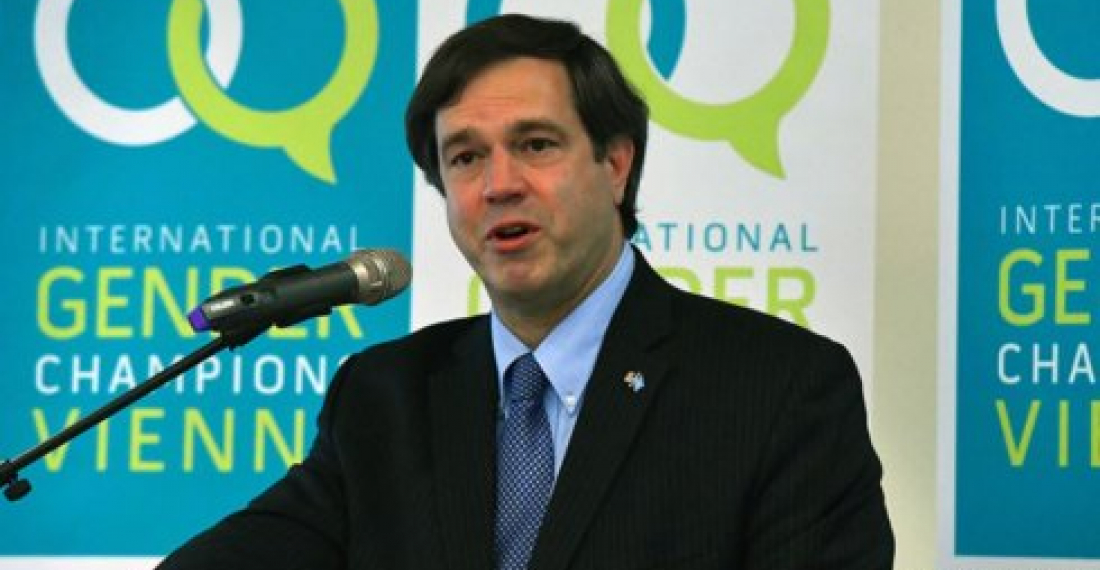There is no acceptable military solution to the Nagorno-Karabakh conflict, while the current status quo is not sustainable over the long term, the US co-chair of the OSCE Minsk Group for the Nagorno-Karabakh conflict's resolution, Andrew Schofer, said in an exclusive interview with Trend.
Schofer emphasized that the United States supports a negotiated settlement to the Nagorno-Karabakh conflict and will continue to engage actively with the sides as a co-Chair of the OSCE Minsk Group.
"The United States' longstanding policy, shared by the Minsk Group Co-Chairs, is that a just settlement must be based on international law, which includes the Helsinki Final Act and the core principles of the non-use of force or threat of force, territorial integrity, and equal rights and self-determination. We also agree that the current status quo in the region is not sustainable over the long term, and that there is no acceptable military solution to the conflict," he said.
The commitments of presidents Ilham Aliyev and Serzh Sargsyan in Geneva to intensify negotiations and to take additional measures to reduce tensions reflect this reality, he said, adding that it should be viewed as positive first steps in a reinvigorated effort to resolve the conflict peacefully through negotiations.
"As co-chairs, we have worked hard with the sides in the months since Geneva to move these commitments towards implementation, and will continue to do so," he added.
Stressing that as a Co-chair country, the United States remains firmly committed to the OSCE Minsk Group co-chair process, Schofer said that the Co-Chairs are prepared to work with the parties in any way that can help bring a lasting settlement.
"We continue to encourage the presidents and foreign ministers to meet at the earliest opportunity to continue discussions on key issues, including the importance of respecting the ceasefire and taking steps towards fully implementing decisions taken in Geneva in 2017, as well as in Vienna and St. Petersburg in 2016," he said.
Touching upon the expansion of the Office of the Personal Representative of the OSCE Chairperson-in-Office, Schofer noted that this would represent an important signal from the sides regarding their stated commitment to taking steps to calm tensions along the line of contact.
"It would also enhance the Mission's ability to fulfill its mandate in a timely and efficient manner. The co-chairs will continue to engage the sides toward realizing this important confidence building measure as soon as possible," he said.
Schofer further noted that the OSCE MG co-chairs have been discussing with the parties for some time the possibility of a follow up to the 2010 assessment mission to the territories affected by the conflict.
"During the January 2018 meetings in Krakow, the co-chairs indicated to the ministers their interest in continuing this discussion, and we will continue to engage the sides regarding the possible terms of such a mission," he said.
Asked about how close are Baku and Yerevan to achieve the sustainable peace, Schofer said that there are no simple solution to the conflict.
"I assumed the role of U.S. co-chair to the OSCE Minsk Group in August 2017. In my time in this position, I have met with a wide range of people focused on all aspects of this conflict. While I have heard many strong views and many good ideas, it is clear that there are no simple solutions to the conflict, and it would be unrealistic to expect that a comprehensive breakthrough will be achieved without a lot more work and preparation, which will take time," he said.
"Moving the process forward in a positive direction will require continued good faith efforts on the part of the parties themselves, the co-chairs, and the international community, and will ultimately require some very tough decisions on all sides."
As for the next visit to the region, he said that the MG co-chairs currently do not have a schedule for the next visit, but will continue to consult with the parties on an appropriate date, taking into account the current electoral period in the region.
source: commonspace.eu with TREND news agency, Baku
photo: Andrew Schofer (archive picture)






